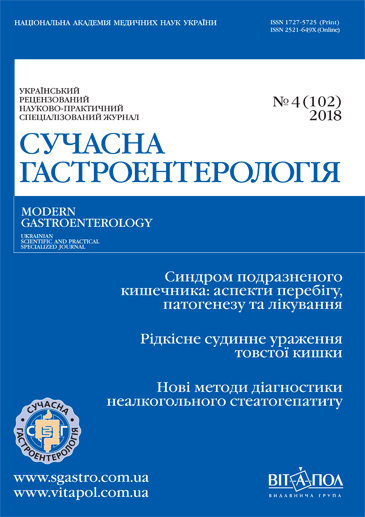Пілотне дослідження поінформованості студентсько-викладацького контингенту щодо гастроезофагеальної рефлюксної хвороби
DOI:
https://doi.org/10.30978/MG-2018-3-17Ключові слова:
гастроезофагеальна рефлюксна хвороба, аналіз інформованості, опитувальник GERD QАнотація
Мета — проаналізувати поінформованість студентсько-викладацького контингенту щодо гастроезофагеальної рефлюксної хвороби (ГЕРХ) та визначити за допомогою анкетування поширеність серед них цього захворювання.
Матеріали та методи. Пілотне дослідження проведено шляхом анкетування 120 осіб віком від 18 до 75 років (чоловіків — 45,0 %, жінок — 55,0 %). Анкета містила 10 запитань, об’єднаних у три блоки. Для діагностування ГЕРХ використовували міжнародний стандартизований опитувальник GERD Q.
Результати. Встановлено зв’язок між віком і ступенем поінформованості щодо ГЕРХ (φ* = 1,9 для р = 0,029) та між віком і схильністю розглядати ГЕРХ як чинник зниження якості життя (для респондентів похилого віку р < 0,01 — Zкритерій часток = 3,84 при Zкрит.= 2,32, для респондентів середнього віку — р < 0,05 (Zкритерій часток = –1,75 при Zкрит. = –1,64). При використанні GERD Q у 8 (6,7 %) респондентів загальний бал становив 8 та більше.
Висновки. Більшість респондентів (83,3 %) не знають про ГЕРХ, з них 73 % — це особи, молодші 40 років. За даними GERD Q, близько 7 % респондентів мали гастроезофагеальний рефлюкс, з них лише 2/3 знали про наявність у них захворювання та розуміли наслідки.
Посилання
Babak MO. Clinical and endoscopic peculiarities of the gastroesophageal reflux disease course in patients with the excessive body mass and obesity (Ukrainian). Modern gastroenterology [Suchasna hastroenterolohiya] (Ukrainian). 2010;1 (51):16-20.
Fadieienko GD, Izmailova OV. Gastroesophageal reflux disease and coronary artery disease: current views and outstanding issues of the comorbidity (Ukrainian). Modern gastroenterology [Suchasna hastroenterolohiya] (Ukrainian). 2015;4 (84):109-117.
Shcherbynina MB, Hladun VM. Efficiency of ursodezoxycolic acid (UDCA) in the therapy of gastroesophageal refl ux disease (GERD). Public health, economy and management in medicine. 017;4 (74):70-73 (Russian).
Contreras-Omaña R, Sánchez-Reyes O, Ángeles-Granados E. Comparison of the Carlsson-Dent and GERD-Q questionnaires for gastroesophageal reflux disease symptom detection in a general population. Revista de Gastroenterología de México. 2017;82(1):19-25. doi: 10.1016/j.rgmx.2016.05.005. Epub 2016 Nov 16.
El-Serag HB, Sweet S, Winchester CC et al. Update on the epidemiology of gastro-oesophageal reflux disease: a systematic review. Gut. 2014;63:871-880.
Fitzgerald RC, Vaezi MF. Esophageal diseases. Gastroenterology. 2018;154(2):263-266. doi: 10.1053/j.gastro.2017.12.017. Epub 2017 Dec 21.
Gastroesophageal reflux disease: Adapted Clinical evidence-based guidance. News of medicine and pharmacy Gastroenterology. 2014;489:34-47.
Gyawali CP et al. Modern diagnosis of GERD: The Lyon Consensus. Gut. 2018;10:1-13. doi: 10.1136/gutjnl-2017-314722.
Hasegawa K, Sato S, Tanimura K et al. Gastroesophageal reflux symptoms and nasal pulmonary disease. Respiratory Investigation. 2018;56(3):230-237. doi: 10.1016/j.resinv.2018.01.001. Epub 2018 Feb 14.
Hsu W.-T., Lai C. -C., Wang Y.- H. et al. Risk of pneumonia in patients with gastroesophageal reflux disease: A population-based cohort study. PLoS ONE. N 12 (8). e0183808. https://doi.org/10.1371/journal.pone.0183808. Published: August 24, 2017.
Jones R, Junghard O, Dent J et al. Development of the GerdQ, a tool for the diagnosis and management of gastro-oesophageal reflux disease in primary care. Aliment Pharmacol Ther. 2009;30:1030 —103 8. doi: 10.1111/j.1365-2036.2009.04142.х
Lee SP, Sung IK, Kim JH et al. The Clinical features and predisposing factors of asymptomatic erosive esophagitis. Dig Dis Sci. 2016;61 (12):3522—3529. Epub: Oct 28,2016.
Rosen R, Vandenplas Y, Singendonk M et al. Gastroesophageal Reflux Clinical Practice Guidelines: Joint Recommendations of the North American Society for Pediatric Gastroenterology, Hepatology, and Nutrition and the European Society for Pediatric Gastroenterology, Hepatology, and Nutrition. Journal of Pediatric Gastroenterology and Nutrition. 2018;66(3):516-554. doi: 10.1097/MPG.0000000000001889.
Shellman Z, Aldhahrani A, Verdon B et al. Bile acids: a potential role in the pathogenesis of pharyngeal malignancy. Clinical Otolaryngology. 2017;42(5):969-973. doi: 10.1111/coa.12822.
Tan SN, Sim SP. Bile acids at neutral and acidic pH induce apoptosis and gene cleavages in nasopharyngeal epithelial cells: implications in chromosome rearrangement. BMC Cancer. 2018;18(1):409. doi: 10.1186/s12885-018-4327-4.
Thrift AP. Barrett’s esophagus and esophageal adenocarcinoma: How common are they really?. Digestive Diseases and Sciences. 2018;18. doi: 10.1007/s10620-018-5068-6. [Epub ahead of print].
Van Teijlingen ER, Hundley V. The importance of pilot studies. Social Research Update. 2001;35:1-4. http://sru.soc.surrey.ac.uk/SRU35.html.
Vogel S, Draper-Rodi J. The importance of pilot studies, how to write them and what they mean. International Journal of Osteopathic Medicine. 2017;23:2-3.
Wang Z, Shaheen NJ, Whiteman DC et al. Helicobacter pylori infection is associated with reduced risk of Barrett’s esophagus: An analysis of the barrett’s and esophageal adenocarcinoma consortium. Am J Gastroenterol. 2018;8. doi: 10.1038/s41395-018-0070-3. [Epub ahead of print].
Young Sun Kim, Nayoung Kim, Gwang Ha Kim J. Sex and gender differences in gastroesophageal reflux disease. Neurogastroenterol Motil. 2016;22(4):575-588.





